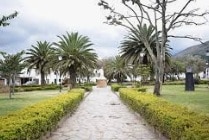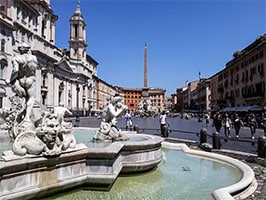 A plaza is a large space located inside a town or city . It is common for several streets to converge there and it is a meeting center for neighbors.
A plaza is a large space located inside a town or city . It is common for several streets to converge there and it is a meeting center for neighbors.
Plazas are public places that take place outdoors . There are squares with very varied characteristics , both in terms of their dimensions and their qualities and uses.
Many times the square stands as the most important place in a town. Historically, in fact, numerous towns have been born around a square, with the main institutions (municipality or town hall, church , banking entities, etc.) in their surroundings.
In general, the squares are characterized by their groves of trees . They can house different species of plants, as well as sculptures and monuments of various kinds. It is also common for squares to have infrastructure for public use such as benches , tables and facilities for practicing sports .
The squares, on the other hand, usually host fairs and markets . Popular celebrations and social protests, meanwhile, can be concentrated in squares.
Since its first versions, the square has been a fundamental part of the city as a structure , both from a social and economic point of view, since it has functioned as a meeting and recreation place but also as a commercial exchange and tourism destination. In fact, culturally we have engraved in our minds a certain attraction to the square to relax and be with other people.
It is believed that the first examples of a plaza appeared when prehistoric tribes began to organize their huts in a circle, leaving a space in the center in which the life of the community developed. It took a long time until commercial activities finally found their ideal place in the square. From its origins, therefore, it had the function of an urban patio and a point around which the most relevant buildings of the community were erected. One of its most representative elements has always been the water fountain.
 In Greek culture we have the agora , a term used to designate the square of an ancient Greek city (the so-called polis ), in which it was normal for people to congregate. The forum , on the other hand, was the public space of Roman cities that also acted as a plaza: commerce, finance, religion and other activities took place there that were combined with the social life of its inhabitants.
In Greek culture we have the agora , a term used to designate the square of an ancient Greek city (the so-called polis ), in which it was normal for people to congregate. The forum , on the other hand, was the public space of Roman cities that also acted as a plaza: commerce, finance, religion and other activities took place there that were combined with the social life of its inhabitants.
For these reasons, the importance given to the agora and the forum when designing ancient Greek and Roman cities was vital. In those that originated as Roman camps, the fortifications of the ancient Empire known as castrum , it is still possible to notice that where their two main roads converged, the plaza was located.
In China there was another model of a plaza: in the palace complex called the Forbidden City , located in Beijing, you can see a structure of several palaces that surround immense courtyards with impressive scenery. The barbarian peoples, on the other hand, did not develop cities or squares, but rather their ways of organizing were not very communal.
Certain areas are also called plazas. That is the case of bullrings , where bullfights take place.
Plaza, finally, can be used as a synonym for vacancy or to refer to the number of seats that a stadium, a theater or a vehicle has. For example: “There are three places available in the next seminar of the renowned speaker” , “The German driver was dissatisfied with the performance of his car on the Monza circuit” , “The city's hotels ran out of places due to the flood tourist” .
